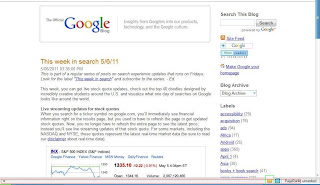Although that's not to say Chrome is superior than FF by a huge margin since it also uses reasonable amount of your RAM, but somehow Chrome manages to stay relatively faster while rendering web pages (it uses the WebKit for page rendering which is known for being "light-weight") and other GUI aspects. Also it's worth mentioning that Google Chrome has a pretty simplified interface which should also be helpful to stay resource friendly.
Anyhow, yesterday Mozilla announced the availability of Firefox version 7 and according to them and my first few hours of using it... it does feel faster!. It's said that it may use 20% to 50% times lesser memory while running (including startup times, multiple tab openings, etc) when compared with the predecessors, mainly due to a feature called MemShrink, developed by Mozilla foundation.
 |
| Firefox 7 in Ubuntu 11.04... |
This however does not fasten-up the web page loading times but only addresses the local resource management of the web browser itself.
Main features...
*. As said before the biggest change is the enhanced memory management (20% to 50% reduce).
*. Better HTML5 rendering and hardware acceleration support.
*. Web page load speed testing support for developers.
*. Opt-in performance report sending to Mozilla to help building an even better browser in the future.
*. With the start of Firefox6, the browser started to highlight the top-level domain URL. And with the version 7.0, the 'http://' URL prefix is now hidden by default (inspired from Chrome :D).
*. Update Web-Socket protocol (the protocol that controls the communication between your PC and the Web-Site that you're trying to load), meaning enhanced security while browsing web pages.
*. Few other CSS improvements and bug fixes are few among the main features to mention (there are no major GUI changes as far as I can see).
Anyhow, if you use Ubuntu, then:
You can install Firefox 7.0 in Ubuntu 10.10 Maverick Meerkat and 10.04 Lucid Lynx thanks to the stable PPA channel. To do that, simply open your Terminal window and enter the below commands.
sudo add-apt-repository ppa:mozillateam/firefox-stable
sudo apt-get update
sudo apt-get install firefox
That should do it. Although not necessary ... but since "things" can happen, just make sure to backup your data such as Bookmars, etc. Just in case.
If you use Ubuntu 11.04 Natty Narwhal, then FF7 is already in the official repositories (not sure if it's available for the 11.10 beta users at this moment though) thus you should've received the automatic updates.
But if you had disabled the automatic updates, then you won't receive "the update". In that case, put the below command into the terminal which should do the trick.
sudo apt-get install firefoxSo, it's true that the Google Chrome is still quite impressive and got me a little worried about Firefox for sometime now.
But when seeing the performance jump, although it may still not be huge (since 50% decrease won't happen to all), yet Firefox 7 is one of the most secured web browsers, although not be the most fastest (yet!), but it's certainly getting there :). Enjoy!.
























